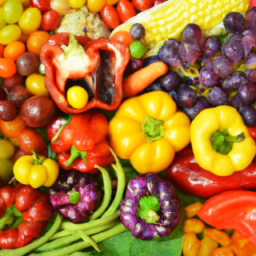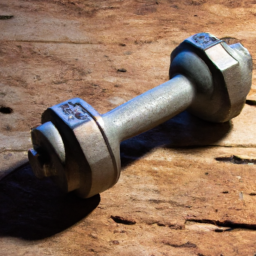If you’re looking to enhance your fitness routine while sticking to a plant-based diet, “Vegan Fitness: How to Fuel Your Workouts on a Plant-Based Diet” is the ultimate guide for you. Packed with valuable information and expert advice, this article is designed to help you optimize your workouts and achieve your fitness goals while following a vegan lifestyle. From understanding the nutritional needs of vegan athletes to discovering the best plant-based protein sources, this article will equip you with the knowledge and tools you need to take your fitness journey to the next level. So, get ready to power up your workouts and fuel your body with the goodness of a plant-based diet.
The Benefits of a Plant-Based Diet for Fitness
Maintaining a plant-based diet can offer a host of benefits for individuals looking to enhance their fitness levels. By incorporating more plant-based foods into your meals, you can enjoy increased nutrient intake, reduced inflammation, improved digestion, and better cardiovascular health.
Increased Nutrient Intake
One of the primary advantages of following a plant-based diet for fitness is the opportunity to increase your nutrient intake. Fruits, vegetables, whole grains, and legumes are all abundant in essential vitamins, minerals, and antioxidants that are crucial for supporting overall health and optimising athletic performance. By diversifying your meals with a wide range of plant-based foods, you can ensure that your body receives the necessary nutrients it needs to thrive during workouts and aid in post-workout recovery.
Reduced Inflammation
Inflammation can hinder athletic performance and impede recovery. However, a plant-based diet can help reduce the levels of inflammation in your body. Many plant-based foods, such as fruits, vegetables, and nuts, contain anti-inflammatory properties due to their high antioxidant content. By incorporating these foods into your diet, you can help alleviate inflammation and promote better recovery after intense workouts.
Improved Digestion
Good digestion is essential for optimal fitness, as it ensures that your body effectively absorbs and utilises nutrients. A plant-based diet, rich in fibre, can improve digestion by promoting regular bowel movements and preventing constipation. Foods such as whole grains, legumes, fruits, and vegetables are excellent sources of fibre. By including these foods in your diet, you can support a healthy digestive system and experience more comfortable workouts.
Better Cardiovascular Health
Maintaining a plant-based diet can contribute to better cardiovascular health, which is crucial for endurance and stamina during physical activities. Plant-based foods, particularly fruits and vegetables, are rich in heart-healthy nutrients such as antioxidants, dietary fibre, and potassium. These nutrients help reduce blood pressure, lower cholesterol levels, and improve overall heart function. By prioritising plant-based foods in your meals, you can support a healthy cardiovascular system and enhance your fitness performance.
Key Nutrients for Vegan Fitness
When following a plant-based diet for fitness, it is essential to pay attention to key nutrients that support your athletic goals. By ensuring adequate intake of protein, carbohydrates, fats, vitamins, minerals, and hydration, you can optimise your performance and recovery.
Protein
Protein is a vital macronutrient that supports muscle repair, growth, and recovery. Plant-based sources of protein include legumes (such as lentils, chickpeas, and black beans), soy products, quinoa, seeds and nuts, and plant-based protein powders. Aim to include a variety of these protein-rich foods in your meals to meet your daily protein needs.
Carbohydrates
Carbohydrates are the primary fuel source for physical activity and play a crucial role in maintaining energy levels during workouts. Whole grains, fruits, vegetables, and legumes are excellent sources of complex carbohydrates, providing long-lasting energy for your fitness goals.
Fats
Healthy fats are essential for hormone production, cell protection, and nutrient absorption. Plant-based sources of healthy fats include avocados, nuts, seeds, and plant oils such as olive and coconut oil. Incorporating these foods into your diet can provide the necessary fats for optimal fitness performance.
Vitamins and Minerals
Vitamins and minerals are essential for numerous bodily functions and play a vital role in supporting overall health and athletic performance. Plant-based foods like fruits, vegetables, whole grains, legumes, and nuts are rich in vitamins and minerals such as vitamin C, vitamin A, iron, calcium, and magnesium. Ensure you consume a wide variety of these nutrient-dense foods to meet your daily requirements.
Hydration
Proper hydration is crucial for athletic performance and overall health. Water is essential for maintaining body temperature, lubricating joints, transporting nutrients, and removing waste products. As a vegan athlete, ensure you drink an adequate amount of water throughout the day and consider consuming hydrating foods such as watermelon, cucumber, and leafy greens.
Sources of Plant-Based Protein
Meeting your protein needs is vital for vegan fitness enthusiasts, as protein supports muscle repair and growth. Fortunately, numerous plant-based foods provide ample amounts of protein to support your fitness goals.
Legumes
Legumes, including lentils, chickpeas, black beans, and kidney beans, are excellent sources of plant-based protein. They are also rich in fibre, which promotes digestion and helps maintain a healthy weight. Incorporate legumes into your meals in various forms, such as soups, stews, salads, or veggie burgers.
Soy Products
Soy products like tofu, tempeh, and edamame are complete sources of protein, providing all essential amino acids. They are versatile ingredients that can be used in stir-fries, sandwiches, or baked dishes. Soy products are also rich in other nutrients like iron and calcium, making them an excellent choice for vegan athletes.
Quinoa
Quinoa is a pseudocereal that serves as a complete plant-based protein source. It contains all nine essential amino acids, making it a valuable addition to your meals. Use quinoa as a base for grain bowls, salads, or even as a substitute for rice in various dishes.
Seeds and Nuts
Seeds and nuts are not only rich in healthy fats but also provide a good amount of protein. Options such as chia seeds, flaxseeds, hemp seeds, almonds, and cashews can be added to smoothies, sprinkled on salads, or enjoyed as a snack. Including a variety of seeds and nuts in your diet can help meet your protein needs while adding essential nutrients.
Plant-Based Protein Powders
Plant-based protein powders, derived from sources such as peas, rice, or hemp, can also be a convenient way to supplement your protein intake. These powders can be easily incorporated into smoothies, baked goods, or mixed with plant-based milk for a quick post-workout shake.
Balancing Your Macronutrients
Achieving the right balance of macronutrients is crucial for vegan fitness enthusiasts to support energy levels, promote muscle growth, and aid in recovery. By prioritising protein, carbohydrates, and fats in your diet, you can fuel your workouts effectively.
Determining Your Protein Needs
The amount of protein you require depends on factors such as your activity level, body weight, and fitness goals. As a general guideline, aim to consume around 0.8 to 1.2 grams of protein per kilogram of body weight. Adjust this amount based on your individual needs and consult with a registered dietitian or nutritionist if needed.
Choosing High-Quality Carbohydrates
When selecting carbohydrates, opt for whole grains, fruits, vegetables, and legumes. These complex carbohydrates provide sustained energy and contain essential nutrients and fibre. Avoid processed and refined carbohydrates to optimize your overall health and fitness performance.
Including Healthy Fats in Your Diet
Incorporate healthy plant-based fats into your meals by including avocados, nuts, seeds, and oils like olive and coconut oil. These fats provide essential nutrients and can aid in post-workout recovery and satiety. However, it’s important to moderate your fat intake to support weight management and prevent overconsumption of calories.
Calculating Your Calorie Needs
To maintain or achieve your desired fitness goals, it’s essential to determine your calorie needs. Caloric requirements vary depending on factors such as age, weight, height, activity level, and goals. Consulting with a registered dietitian or using online calculators can help you establish a suitable caloric intake for your specific needs.
Pre-Workout Meal and Snack Ideas
Fueling your body properly before a workout is essential for optimal performance and energy levels. Consider incorporating the following plant-based pre-workout meal and snack ideas into your routine:
Banana and Almond Butter
Pairing a banana with a spoonful of almond butter provides a perfect combination of carbohydrates and healthy fats. This snack offers a quick source of energy and can be consumed 30 minutes to an hour before exercising.
Oatmeal with Berries and Chia Seeds
A bowl of oats topped with fresh berries and a sprinkle of chia seeds makes a nutritious and filling pre-workout meal. Oats provide sustained energy, while berries offer antioxidants, and chia seeds add an extra boost of healthy fats and fibre.
Veggie Wrap with Hummus
Wrap your favorite veggies and a generous dollop of hummus in a whole wheat or gluten-free wrap for a light yet energizing pre-workout meal. This option provides complex carbohydrates, protein, and fibre to keep you fueled during your workout.
Smoothie with Plant-Based Protein Powder
Blend a smoothie using plant-based protein powder, frozen fruits, leafy greens, and your choice of plant-based milk for a quick and easily digestible pre-workout option. This smoothie provides a combination of carbohydrates and protein to support your athletic performance.
Energy Balls with Dates and Nuts
Making homemade energy balls using dates, nuts, and seeds allows you to have a convenient and nutrient-dense pre-workout snack. These energy balls are high in carbohydrates, healthy fats, and fibre, helping to sustain your energy levels throughout your workout.
Hydration for Vegan Athletes
Staying properly hydrated is crucial for optimizing your athletic performance and overall health. Adequate hydration promotes energy, endurance, metabolism, and aids in recovery. As a vegan athlete, consider the following aspects of hydration to enhance your workouts:
Importance of Staying Hydrated
Proper hydration is vital for maintaining optimal bodily functions, including regulating body temperature, lubricating joints, and transporting nutrients. During workouts, staying hydrated helps minimize the risk of dehydration, heat-related illnesses, and muscle cramping.
Water Intake Recommendations
Vegan athletes should aim to consume an adequate amount of water throughout the day. While individual water needs vary based on factors such as body weight, climate, and activity level, a general guideline is to drink at least 8 cups (64 ounces) of water daily. Additionally, be mindful of increasing your water intake during intense workouts or in hot weather to ensure hydration.
Electrolyte-Rich Drinks
Electrolytes are minerals that help maintain proper fluid balance in your body. During intense workouts or prolonged exercise, electrolytes can be lost through sweat. Consuming electrolyte-rich drinks, such as coconut water or homemade sports drinks made with fruits and a pinch of salt, can help replenish these essential minerals.
Hydrating Foods
In addition to drinking water, incorporating hydrating foods into your diet can further support hydration. Watermelon, cucumber, strawberries, oranges, and leafy greens are examples of plant-based foods with high water content. Including these foods in your meals and snacks can contribute to your overall hydration status.
Post-Workout Recovery for Vegans
Optimizing post-workout nutrition is crucial for vegan athletes to replenish energy stores, support muscle recovery, repair tissue damage, and reduce inflammation. Consider the following strategies for post-workout recovery:
Importance of Post-Workout Nutrition
Consuming a well-rounded post-workout meal or snack is essential for maximizing athletic gains. When you exercise, your body uses glycogen stores (carbohydrates) and breaks down muscle proteins. Adequate nutrition after a workout helps replenish glycogen stores and initiate muscle protein synthesis for recovery and growth.
Refueling with Carbohydrates
During and after intense workouts, it is crucial to replenish glycogen stores by consuming carbohydrates. Opt for whole grain options like brown rice, quinoa, or whole wheat bread to provide sustained energy and promote glycogen recovery. Incorporating fruits and vegetables also contributes to the carbohydrate content while providing essential vitamins and minerals.
Rebuilding with Protein
Protein intake after a workout is essential to support muscle recovery and rebuilding. Plant-based protein sources such as tofu, tempeh, legumes, and plant-based protein powders can effectively provide the necessary amino acids. Aim to consume approximately 20-30 grams of protein within 30-60 minutes after your workout.
Replacing Electrolytes
Sweating during exercise leads to the loss of electrolytes, particularly sodium and potassium. Drinking electrolyte-rich beverages, such as coconut water or homemade sports drinks, helps restore these essential minerals and aids in rehydration.
Including Anti-Inflammatory Foods
To minimize exercise-induced inflammation, consider incorporating anti-inflammatory foods into your post-workout meals. Examples include leafy greens, berries, turmeric, ginger, and flaxseeds. These foods offer beneficial compounds that can reduce inflammation and promote recovery.
Supplements for Vegan Athletes
While a well-planned plant-based diet can provide most of the nutrients you need, some supplements may be beneficial for vegan athletes to ensure optimal health and performance.
B12 and Vitamin D
Vegan diets may be low in vitamin B12 and vitamin D, primarily found in animal products. Consider taking a B12 supplement and getting sufficient sunlight exposure for vitamin D synthesis. Regular blood testing is recommended to monitor your levels and consult with a healthcare professional or registered dietitian for individualized guidance.
Omega-3 Fatty Acids
Plant-based sources of omega-3 fatty acids, such as flaxseeds, chia seeds, and walnuts, provide a type called alpha-linolenic acid (ALA). However, vegan athletes may benefit from an algal-based omega-3 supplement to ensure adequate intake of EPA and DHA, which are more readily used by the body.
Creatine
Creatine is an amino acid compound that supports energy production, muscle strength, and power output. While it is commonly found in animal products, vegan athletes can opt for a plant-based creatine supplement derived from fermented sources like corn or rice.
Iron and Zinc
Iron and zinc are minerals that are vital for numerous physiological functions, including energy production, immune function, and muscle growth. Plant-based sources of iron (such as legumes, fortified cereals, and dark leafy greens) and zinc (such as legumes, nuts, and whole grains) should be emphasized in your diet. However, if you have concerns about meeting your needs, consider consulting with a healthcare professional or registered dietitian to determine if supplementation is necessary.
Plant-Based Recovery Powders
Plant-based recovery powders are specially formulated to replenish nutrients and support the recovery process after intense workouts. These powders often contain a combination of protein, carbohydrates, electrolytes, and additional supplements like BCAAs (branched-chain amino acids) or glutamine. Look for products that are free of animal-derived ingredients and sourced from quality plant-based sources.
Meal Planning Tips for Vegan Fitness
Implementing a well-thought-out meal plan can help vegan athletes maximize their fitness goals and maintain a balanced diet. Consider the following tips for effective meal planning:
Focus on Whole Foods
Center your meals around whole, minimally processed plant-based foods. These include fruits, vegetables, whole grains, legumes, nuts, and seeds. Whole foods offer a variety of nutrients and provide optimal nourishment for your body.
Variety and Diversity
Ensure your meal plan includes a diverse range of plant-based foods to obtain a wide array of nutrients. By incorporating fruits and vegetables of different colors, trying various grains, and experimenting with different plant-based protein sources, you can enhance the overall nutrient density of your meals.
Meal Prepping and Batch Cooking
Meal prepping and batch cooking can save time and ensure that you have nutritious meals readily available throughout the week. Set aside a specific day to plan and prepare meals and snacks for several days ahead. This practice helps you stay consistent with your diet and avoid relying on less healthy options when time is limited.
Snack Planning
Plan and prepare healthy snacks to have on hand when hunger strikes between meals. Options like cut-up fruits, raw vegetables with hummus, homemade energy balls, or mixed nuts can provide quick and convenient fuel for your workouts.
Listening to Your Body
While following a meal plan is beneficial, it’s essential to listen to your body’s unique needs and adjust accordingly. Pay attention to hunger and fullness cues, experiment with different foods and meal timings, and make modifications to your meal plan as necessary.
Conclusion
Embracing a plant-based lifestyle can provide numerous benefits for individuals seeking optimal fitness and performance. By incorporating nutrient-dense plant foods, athletes can increase their nutrient intake, reduce inflammation, improve digestion, and enhance cardiovascular health. Prioritizing key nutrients such as protein, carbohydrates, fats, vitamins, minerals, and hydration ensures that vegan fitness enthusiasts have a well-rounded diet that supports their athletic endeavors. With proper meal planning, supplementation when necessary, and mindful attention to post-workout recovery, vegan athletes can thrive and achieve their fitness goals while enjoying a sustainable and plant-powered lifestyle.





